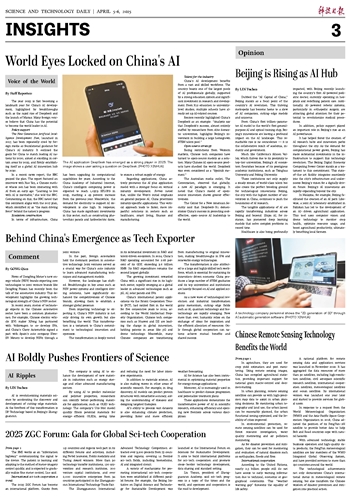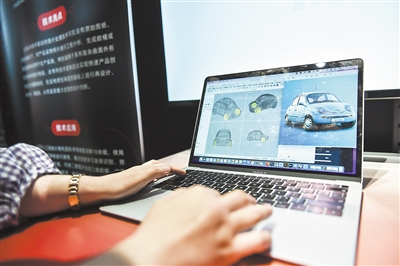
 |
| A technology company personnel shows the "2D generation of 3D" through AI automatic generation software. (PHOTO: XINHUA) |
Dubbed the "AI Capital of China," Beijing stands as a focal point of the country's AI revolution. This thriving metropolis has become home to a slew of AI companies, cutting-edge models and unicorns.
From China's first trillion-parameter AI model to the world's first general-purpose AI and optical training chip, Beijing's innovations are leaving a profound impact on the AI landscape. This remarkable rise is no coincidence — it is the collaborative result of academia, industry and government.
Much like California's Silicon Valley, which thrives due to its proximity to top-tier universities, Beijing's AI ecosystem flourishes because of its prestigious academic institutions, such as Tsinghua University and Peking University.
These institutions not only supply a steady stream of world-class talent but also create the perfect breeding ground for technological innovations. Beijing, the city with the highest number of universities in China, continues to push the boundaries of AI research.
The tangible applications of AI are rapidly transforming industries across Beijing and beyond. Zhipu AI, for instance, has pioneered deep learning models that solve complex problems in record time.
Healthcare is also being profoundly impacted, with Beijing recently launching the country's first AI-powered pediatric doctor, currently operating in hospitals and redefining patient care. Additionally, AI-powered robotic systems, particularly in orthopedic surgery, are attracting global attention for their potential to revolutionize medical procedures.
In addition, policy support played an important role in Beijing's rise as an AI powerhouse.
It has helped foster the creation of AI research hubs and innovation parks throughout the city. As the demand for computational power grows, Beijing has made substantial investments in the infrastructure to support this technology revolution. The Beijing Digital Economy Computing Power Center stands as a testament to this commitment. This state-of-the-art facility integrates seamlessly into the city's infrastructure and underscores Beijing's vision for a digitally driven future. Beijing's AI innovations are rapidly expanding beyond the city.
In Malaysia, for example, Beijing facilitated the creation of an AI park. Likewise, a joint AI laboratory established in Pakistan has led to the development of an AI-driven agricultural application. This tool uses computer vision and drone technology to monitor crop health, optimize resource usage, and boost agricultural productivity, ultimately benefiting local farmers.


 Next
Next




